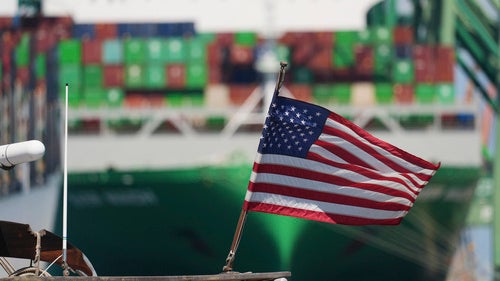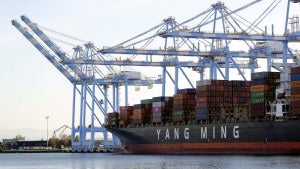Trade War Keeps Cost-Conscious Americans on the Edge of Their Seats

Most think Trump is focusing too much on tariffs and not enough on the rest of the economy. A few, however, think trade barriers are worth the price.
On April 2, US President Donald Trump proclaimed “America’s economic independence” with a shocking raft of tariffs on all foreign imports, the first of their kind in almost a century. Trump had already imposed sweeping tariffs on Canadian, Mexican, and Chinese imports in his first two months back in office. The new tariffs, which sent financial markets into freefall, are wreaking havoc on the confidence of investors, businesses, and consumers and sparking fears of recession.
Though Trump has persistently outpolled his opponents on his ability to handle the economy in the past, he now is gambling with the reputation that got him elected. At a moment when Americans report pocketbook issues as their top-ranked worry, Republicans and Democrats alike anticipate a surge in the prices of consumer goods. But in the long run, Republicans believe prices will come back down and Americans workers will benefit. Democrats aren’t as optimistic.
It’s the Economy, Stupid!
In the annual 2024 Chicago Council Survey—fielded just months before the 2024 US presidential election—more than three-quarters of Americans said that the economy in general (85%) and inflation (78%) would matter a great deal or a fair amount when deciding who to vote for. At the time, Americans were growing increasingly frustrated over the high cost of consumer goods and looking to the next president to stabilize and improve the US economy. For many voters, a potential Trump presidency promised better jobs and lower prices.
However, polling shows a gap between the economic aspirations of Americans and their evaluation of the administration’s current policies. Just days before Trump announced the “Liberation Day” tariffs at the Rose Garden, a CBS News/YouGov poll fielded March 27-28, 2025, showed 84 percent of US adults consider Trump’s actions on the economy and inflation “very important” for evaluating his performance as president. Yet only half currently approve of how he is handling the economy (48%) and inflation (44%), similar to an analogous CBS/YouGov poll fielded a month prior from February 26-28, 2025 (51% and 46% respectively).
Breaking down the issue-approval numbers shows stark divisions along party lines, though this may not be apparent at first glance. Democrats (83%) and Republicans (87%) are united in saying Trump’s actions on the economy and inflation are “very important” to doing a good job as president. However, they evaluate his actual performance very differently. Republicans are vastly more likely than Democrats to approve of Trump’s actions on the economy (88% vs. 14%) and inflation (82% vs. 10%).
No Pain, No Gain?
Unsurprisingly, Republicans and Democrats are split on the potential impact of Trump’s “declaration of economic independence.” Democrats outnumber Republicans four-to-one in opposing further tariffs on imported goods (88% vs. 22%). The difference in attitudes lies in how they anticipate things will play out next. A majority of US adults (72%) believe tariffs will increase prices in the short run, with Democrats and Republicans largely united in this judgement (82% and 64%). However, 76 percent of Democrats also believe that the tariffs will continue to affect prices over the coming years. In contrast, just 19 percent of Republicans believe that their impact will persist over the long term.
Other polling confirms a partisan split in the perception of long-run effects. In a Guardian/Harris Poll survey conducted March 8-12, 2025, 85 percent of Democrats said they believe the US economy will “take years to recover from Trump’s tariffs,” compared to just 52 percent of Republicans. Relatedly, the same survey shows almost nine in 10 Democrats (89%) fear a recession versus just two-thirds of Republicans (65%).
Some, however, consider the pain to be worth it. The Reuters / Ipsos Tariff and Foreign Policy Survey shows a majority of Republicans (58%) agree that Washington should impose higher tariffs even if prices increase, compared to just one-in-20 Democrats (5%).
One important reason for this difference in tariff-induced pain tolerance lies in diverging expectations about what tariffs will do for American labor. Only 7 percent of Democrats agree that “in general, when the U.S. charges tariffs on imported goods, American workers come out ahead,” compared to more than half of Republicans (56%). Similarly, a poll by Navigator Research fielded March 13-17, 2025, shows 60 percent of Republicans think imposing new tariffs will help American workers compared to just 8 percent of Democrats.
Trade Nostalgia Redux
“Liberation Day” has pushed American tariffs rates to highs not seen since the 1930s under the infamous Depression-era Smoot-Hawley Tariff Act, and polling suggests that Americans may soon long for the days when trade was free. A February 12-14, 2025, CBS News/YouGov survey finds that a majority of US adult citizens (64%) want more trade (27%) or trade policy to remain as is (37%), while just 14 percent think the US should trade less with other countries.
Interestingly, Americans may look back fondly on the Trump years before the “shot heard ‘round the world” as a golden era for trade compared to Biden’s reign. A Gallup poll fielded February 3-16, 2025, finds that from 2017 to 2020, the percentage of Americans agreeing that “foreign trade represents an opportunity for growth” never dropped below 70 percent. This figure now stands at eight in 10 people (81%), compared to the Biden years when it hovered between 61 and 63 percent.
Breaking down the numbers by party, over two-thirds of Republicans backed trade during Trump’s first term (66-77% from 2017-2020), but this number dropped consistently to fewer than half under Biden (44-43% from 2021-2024). This is hardly surprising considering that partisans are generally more optimistic when one of their own is in power. Gallup polling shows that confidence in the economy plummeted among Republicans during the Biden presidency and ticked back up during the Trump transition. The opposite was true for Democrats.
Yet the February poll is notable because it shows Democrats were also more likely to consider trade an opportunity under Trump than Biden, though the needle moved less for them than for Republicans. Democratic favorability toward trade jumped from a Biden-era low of 71 percent in 2024 to 86 percent during the Trump transition in 2025. In other words, Republicans and Democrats share a rare consensus on trade as an opportunity for growth under Trump compared to Biden. The new tariffs will likely make that a thing of the past.
Conclusion
Trump rode into office on a wave of confidence about his ability to steer the American economy. Despite consistent majorities of Americans saying that trade is an opportunity for economic growth, the new president has erected the highest protectionist walls in living memory. He is betting that they will bring manufacturing back to US shores and usher in a new golden age for American industry.
The public is clear-eyed about the short-run effects: regardless of partisan affiliation, a majority of US adults believe higher tariffs mean higher inflation. But Republicans and Democrats are deeply divided on the long-run impact of this gambit. Republicans believe that prices will fall in the coming years and that American workers will eventually come out ahead. Democrats are pessimistic on both fronts.
Financial markets despise uncertainty. In the wee hours of the morning on April 4, China struck back with 34 percent tariffs, sending stocks plunging even further as US markets opened on Friday morning. It will take many more moons to ascertain whether tariff-happy voters have found themselves getting more than they bargained for. At the Rose Garden on April 2, Trump remarked: "hopefully, you're going to look back in years to come and you're going to say, you know, he was right." In the meantime, Americans and the rest of the world will wait with bated breath and prepare to scrape by with fewer eggs in their omelets.




Related Content

Suzanne Lynch, Ken Moriyasu, and Gideon Rachman join Ivo Daalder to discuss the week's top news stories.
 Public Opinion
Public Opinion
Pandemic-era shortages seem to have strengthened the public's appetite for greater economic self-sufficiency.
